Ditapis dengan

Protecting the Rights of People with Autism in the Fields of Education and Em…
The Council of Europe and the European Union (EU) have not developed ad hoc legal rules or hard law instruments specifically aimed at protecting the rights of people with autism. At European regional level, the special situation and needs of individuals with autism find recognition and protection within the wider legal framework concerning the rights of persons with disabilities as well as with…
- Edisi
- -
- ISBN/ISSN
- 978-3-319-13791-9
- Deskripsi Fisik
- 202 hlm.
- Judul Seri
- -
- No. Panggil
- -
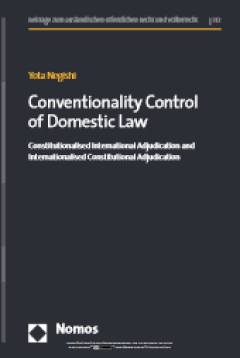
Conventionality Control of Domestic Law: Constitutionalised International Adj…
Through gaining lessons from the doctrine of constitutionality control, the book deals principally with conventionality control achieved by judicial adjudicators. This monograph fills the gap in comparative international human rights law by analysing the practice of conventionality control in Europe and Latin America. Based on the empirical data, the author normatively envisions a ‘trapezium�…
- Edisi
- -
- ISBN/ISSN
- 978-3-7489-2983-3
- Deskripsi Fisik
- 252 hlm.
- Judul Seri
- -
- No. Panggil
- -

Covid-19 and Capitalism : Success and Failure of the Legal Methods for Dealin…
This open access book provides a comprehensive analysis of the socioeconomic determinants of Covid-19. From the end of 2019 until presently, the world has been ravaged by the Covid-19 pandemic. Although the cause of this is (obviously) a virus, the extent to which this virus spread, and therefore the number of infections and deaths, was largely determined by socio-economic factors. From this, i…
- Edisi
- -
- ISBN/ISSN
- 978-3-030-92901-5
- Deskripsi Fisik
- XXIII, 1092p
- Judul Seri
- -
- No. Panggil
- -
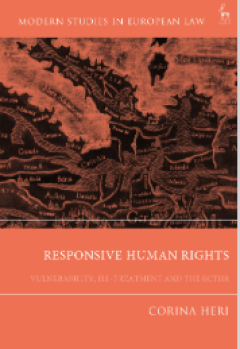
Responsive Human Rights: Vulnerability, Ill-treatment and the ECtHR
Who is a vulnerable person in human rights law? This important book assesses the treatment of vulnerability by the European Court of Human Rights, an area that has been surprisingly under explored by European human rights law to date. It explores legal-philosophical understandings of the topic, providing a theoretical framework that can be used when examining the question. Not confining itself …
- Edisi
- -
- ISBN/ISSN
- 978-1-50994-125-4
- Deskripsi Fisik
- 261 hlm.
- Judul Seri
- -
- No. Panggil
- -
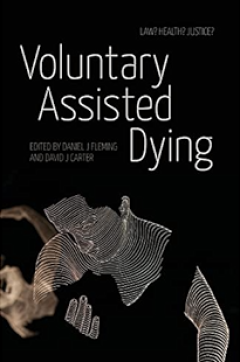
Voluntary Assisted Dying: Law? Health? Justice?
Since the introduction of voluntary assisted dying in 2019, a 'new moment' in the governance of life and death has opened up within the Australian context. This new moment demands new questions be asked regarding the regime and its effects in this new era for law, health care and justice. This collection brings together critical perspectives on voluntary assisted dying itself, and on various pr…
- Edisi
- -
- ISBN/ISSN
- 978-1-760-46505-6
- Deskripsi Fisik
- 216 hlm.
- Judul Seri
- -
- No. Panggil
- -

Cybersecurity in Poland: Legal Aspects
This book explores the legal aspects of cybersecurity in Poland. The authors are not limited to the framework created by the NCSA (National Cybersecurity System Act – this act was the first attempt to create a legal regulation of cybersecurity and, in addition, has implemented the provisions of the NIS Directive) but may discuss a number of other issues. The book presents international and EU…
- Edisi
- -
- ISBN/ISSN
- 978-3-030-78551-2
- Deskripsi Fisik
- 506 hlm.
- Judul Seri
- -
- No. Panggil
- -

Contemporary French Administrative Law
Written from a comparative perspective, this book offers an authoritative English-language introduction to the key features of French administrative law and institutions. Using a systematic approach and with a variety of illustrative case study, this is a valuable resource for any student or researcher with an interest in French law. Ditulis dari perspektif komparatif, buku ini menawarkan pe…
- Edisi
- -
- ISBN/ISSN
- 978-1-009-05712-7
- Deskripsi Fisik
- 380 hlm.
- Judul Seri
- -
- No. Panggil
- -
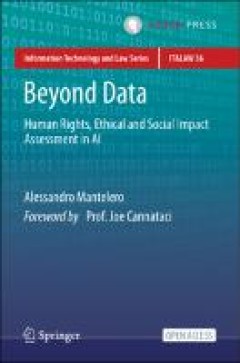
Beyond Data: Human Rights, Ethical and Social Impact Assessment in AI
This book focuses on the impact of Artificial Intelligence (AI) on individuals and society from a legal perspective, providing a comprehensive risk-based methodological framework to address it. Building on the limitations of data protection in dealing with the challenges of AI, the author proposes an integrated approach to risk assessment that focuses on human rights and encompasses contextual …
- Edisi
- -
- ISBN/ISSN
- 978-94-6265-531-7
- Deskripsi Fisik
- 215 hlm.
- Judul Seri
- Information Technology and Law Series
- No. Panggil
- -
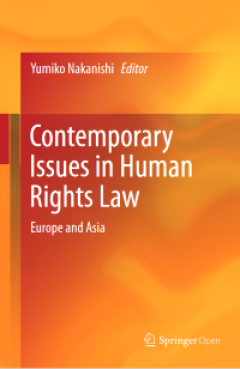
Contemporary Issues in Human Rights Law: Europe and Asia
This book analyzes issues in human rights law from a variety of perspectives by eminent European and Asian professors of constitutional law, international public law, and European Union law. As a result, their contributions collected here illustrate the phenomenon of cross-fertilization not only in Europe (the EU and its member states and the Council of Europe), but also between Europe and Asia…
- Edisi
- -
- ISBN/ISSN
- 978-981-10-6129-5
- Deskripsi Fisik
- 218 hlm.
- Judul Seri
- -
- No. Panggil
- -

The Rule of Law in the United States: An Unfinished Project of Black Liberation
What is the American rule of law? Is it a paradigm case of the strong constitutionalism concept of the rule of law or has it fallen short of its rule of law ambitions? This open access book traces the promise and paradox of the American rule of law in three interwoven ways. It focuses on explicating the ideals of the American rule of law by asking: how do we interpret its history and the goals …
- Edisi
- -
- ISBN/ISSN
- 978-1-50994-001-1
- Deskripsi Fisik
- 215 hlm.
- Judul Seri
- -
- No. Panggil
- -
 Karya Umum
Karya Umum  Filsafat
Filsafat  Agama
Agama  Ilmu-ilmu Sosial
Ilmu-ilmu Sosial  Bahasa
Bahasa  Ilmu-ilmu Murni
Ilmu-ilmu Murni  Ilmu-ilmu Terapan
Ilmu-ilmu Terapan  Kesenian, Hiburan, dan Olahraga
Kesenian, Hiburan, dan Olahraga  Kesusastraan
Kesusastraan  Geografi dan Sejarah
Geografi dan Sejarah